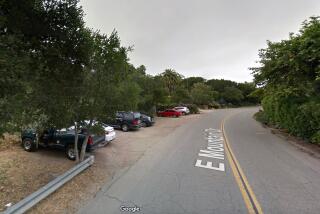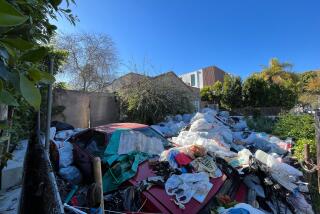You don’t tend my flowers anymore, owner says
- Share via
Question: I’ve owned my town home for more than 10 years. All 40 town homes in our development have their own small but very noticeable common areas by the front doors and outside our patio walls. Although all other units have common-area frontage with well-tended flowers, mine consists of dirt and rotting vegetation. Every rainy season brings more mud in front of my unit. Whenever I mention this ongoing problem to the board president, he says “it’s noted” or “we’re working on it” but does nothing.
I believe each successive board president has instructed association gardeners to bypass my unit when maintaining the grounds. The landscape company owner told me that the board president ordered him and the gardening chairwoman to instruct his gardeners not to plant any flowers at my unit. He said the gardening chairwoman told him to stop after he does the unit next to mine. No board instructions or discussions regarding this issue appear in any minutes.
I want to sue the board president and the gardening chairwoman. Can I do that without suing the rest of the board, and does it matter if they are on the board at the time that I sue?
Answer: The homeowner association can be sued as an entity, and board directors can be sued individually whether they are sitting directors or officers at the time a lawsuit is filed. But, before filing a lawsuit, consider inviting those two board directors and all present board members to engage in voluntary mediation or arbitration to resolve this situation.
A portion of your monthly association dues is likely allocated toward landscaping the common areas. The board’s obligations are to repair, replace and maintain the “entire” common area, including that portion in front of your unit. Failure to do so is a breach of the board’s legal duty for which the entire board can be sued.
If the problem is not resolved after reasonable efforts, begin organizing relevant doc- uments. Keep a journal of daily events as they pertain to gardening. Attend all board meetings to learn if any progress is being made regarding your complaints and get copies of minutes from those meetings.
Maintain notes from conversations relating to the problem and keep copies of all letters to and from the board and management personnel. Take photographs of the noticeable differences between the other units and yours. Photograph the gardeners as they work, and videotape events where they can be seen stopping short of your unit.
Address the issue by writing to the board asking why your unit is the only one with inferior landscaping. Mention the mud and rotting vegetation and its effect on the use and enjoyment of your unit. The board’s failure to respond or a response that is meaningless may weaken their defense should a lawsuit ensue.
Whether you sue the association and/or individual board members, the association could be held liable for damages and it may also be ordered to pay your attorney’s fees.
If it is shown that they breached their duties by instructing gardeners to pass by your unit, individuals named in a lawsuit might have to pay their own costs.
If you decide to file suit in Small Claims Court, or hire an attorney to commence an action in Superior Court, the principal cause of action for your case is enforcement of the covenants, conditions and restrictions (CC&Rs;) and the board’s obligation under the law to repair, replace and maintain the property -- including your landscape maintenance. If your unit sustains damage because of mud or spoilage that would not have occurred if properly maintained, then you could recover those damages as well as your attorney’s fees.
--
Send questions to P.O. Box 11843, Marina del Rey, CA 90295, or e-mail noexit@mindspring.com.






